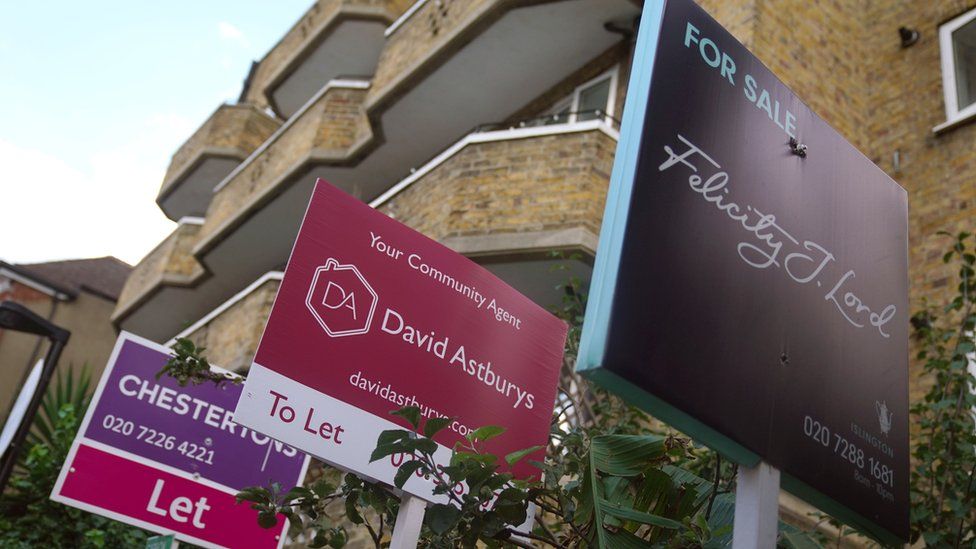 Image source, PA Media
Image source, PA MediaThe average cost of rent in the UK rose by 9% in the 12 months to February this year – the highest annual increase since records began in 2015.
There were price rises in all parts of the country, according to the Office for National Statistics (ONS).
In England, London renters saw costs go up the most at 10.6%, taking average monthly rent in the capital to £2,035.
A government spokesperson said its Renters (Reform) Bill would give tenants and landlords a "fairer deal".
Average monthly rent increases across the UK ranged from 8.8% in England through to 10.9% in Scotland and 9% in Wales.
This meant tenants in each country paid an extra £104, £93 or £60 a month respectively.
Northern Ireland's data lags behind the rest of the UK, with figures currently available up to the end of last year. The ONS reported a 9.3% increase in the country for the year to December 2023.
London – which saw the biggest increase overall – had the UK's highest rent even before the latest inflation figures were published on Wednesday.
In England and outside of the capital, Bristol was the most expensive place to rent privately – costing £1,734 a month.
Meanwhile, average UK house prices fell by 0.6% in the year to January, though it marked a slower drop than the 2.2% annual fall recorded a month earlier.
Rent prices have gradually increased across the UK since the ONS began collecting data for the whole of the UK in 2015, but have spiked since 2022.
Research, published by data-gathering website Statista, suggested landlords were upping their prices due to the increased costs of running a rental property.
But that was not the only reason. In a survey of almost 1,000 landlords, carried out towards the end of last year, more than half (59%) said they were trying to "align with local market rents".
Ben Beadle, of the National Residential Landlords Association, blamed the "chronic shortage of properties to meet demand" for rents being hiked up.
"The chancellor needs to develop growth tax measures to ensure a healthy supply of quality homes to rent," he said, pointing to advice from leading economic research group the Institute for Fiscal Studies that the "more harshly landlords are taxed, the higher rents will be".
A spokesperson for the Department for Levelling Up, Housing and Communities said it recognised "the cost-of-living pressures tenants are facing" and "our landmark Renters (Reform) Bill offers a new, fairer deal for tenants and landlords".
"The most recent data shows the size of the private rented sector has doubled since 2004, peaking in 2016 and has remained roughly stable since," they added.
A key part of the Renters (Reform) Bill – first introduced last May – was to ban no-fault evictions by the next general election.
The bill has still not passed through the House of Commons, and last month the BBC saw draft amendments which suggested ministers were consulting backbench Tory MPs on watering down the planned protections for renters in England.
At the time, the government insisted the bill would "abolish" section 21 evictions – the official name for no-fault evictions – "giving people more security in their homes and empowering them to challenge poor practices".
Gill, a 63-year-old renter from Surrey, told the BBC she had been issued with multiple section 21 notices by her landlord – the most recent telling her she had to vacate where she lives by the end of April.
Having pushed back and sought advice from various housing associations, Gill said her landlord "finally admitted it was because he could get £300 more than what I was paying".
"Sadly, I can't pay him more at the moment because I'm not working," Gill said, adding she could "barely afford" the rent when she was in a job due to rising costs.
Gill was diagnosed with cancer earlier this year and has been signed off work to receive medical treatment, including a six-month course of chemotherapy due to start on Thursday.
"You hear horror stories about people turning up to where they live to find their belongings in bin bags outside… I just pray that doesn't happen to me," she said.
Responding to the latest rent figures, housing charity Shelter's chief executive Polly Neate said private renting had "reached boiling point".
"Decades of failure to build genuinely affordable social homes has made private renting the only option for many, and as a result, competition for overpriced and often shoddy rentals is fierce," she said.
Ms Neate said this meant landlords were free to "hike up the rent, safe in the knowledge that if their tenants can't pay, they can issue a no-fault eviction with just two months' notice and get a new tenant at a higher rent".
"To help struggling families keep hold of their homes, the government must keep its promise to renters and pass a watertight Renters (Reform) Bill to ban no-fault evictions," she added.





